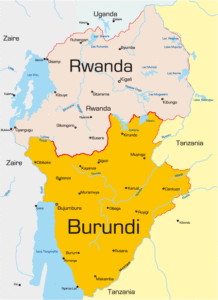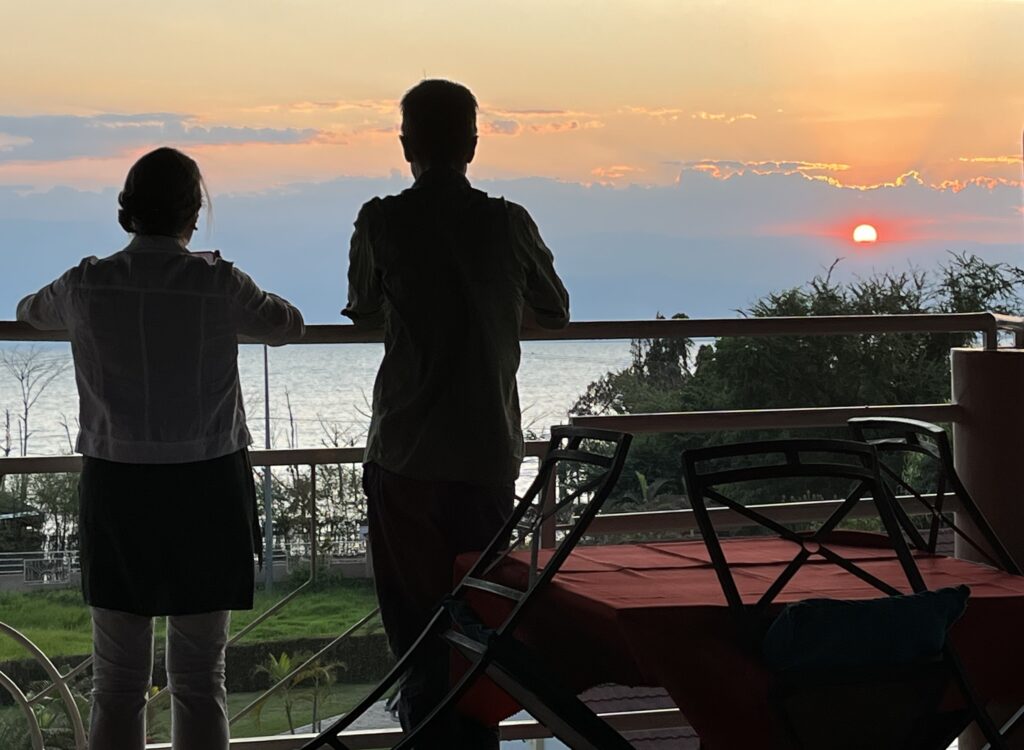For twenty years, we have worked in Rwanda. Yet, we have been aware there is also great need for what we offer in the less well-known country next door, Burundi. Like Rwanda, it is green and mountainous, with most of its population depending on subsistence agriculture. It exports coffee, tea and fish, and it had a regional tourist business until recent floods destroyed the resorts on the shores of beautiful Lake Tanganyika.

Burundi may be obscure, but it has suffered years of devastating ethnic-based persecution, leaving people traumatized by their experiences. Unlike Rwanda, conflict continues in a low-level but terrifying manner that does not make the headlines beyond its borders. Large numbers of Burundians have emigrated, seeking work and safety.
Purely by chance, we were put in contact with a trustworthy – and efficient – local NGO. Over the course of several zoom meetings, they told us there was real need for the trauma counselling training model that we use elsewhere (Uganda, Rwanda and Sierra Leone). We knew we had to act.
Suffering From Neglect
One consequence of being overlooked by the international community is that little practical support flows into Burundi. In the lingo of the sector, Burundi is not an “aid darling.” Network for Africa has always aimed to fill the gaps left by bigger charities. Following a week at our Rwandan projects, we visited Bujumbura and ran a pilot project. With us was Dr Shelly Evans, Network for Africa’s volunteer psychotherapist from Missouri.
With the help of our impressively organized local Burundian NGO partner, Shelly trained a group of twenty community leaders. The group discussed the role of counsellors in their society and the challenges they face because of local culture, tradition and security concerns. Through role-playing exercises, they learned relaxation exercises, “grounding” to counteract panic attacks and flashbacks, the importance of listening to what people tell you (and don’t tell you), finding a safe space when intrusive and unhelpful memories haunt a survivor, and how to draw on one’s inner strength.
It’s always complicated when you’re training counsellors who are themselves survivors of genocide and conflict, and who continue to face daily danger. As the Network for Africa team watched Shelly as she guided the group through five days of intensive training, we were astonished by how the participants found laughter in bleak situations, teasing each other affectionately, and displaying what we would call gallows humour/humor.
Learning And Listening
This newsletter is deliberately vague about the identities of the participants and where we did the training: we have to be sensitive to the risks facing our Burundian colleagues. They turned up early each day and stayed late, with seemingly limitless enthusiasm to sharpen their counselling skills. We were struck by a sense of social cohesion, a mood of “we’re all in this together”, and a lack of self-pity. They are determined to help their fellow citizens, despite the challenges.
They told us there is great need for community education, particularly in rural areas, to dispel commonly held beliefs about the problems faced by traumatized survivors of conflict. Our Burundian partners are also determined to build on our Network for Africa model of counsellors training lay counsellors who then organize regular group therapy sessions around the country.

We would like to return to Burundi, working with the same group, adding to their skills and equipping them with further tools to help the people they counsel; our aim is to roll out our model of local lay counsellors and community education. And conveniently for us, we can visit our projects in Rwanda, Uganda and Burundi all in one trip, keeping our costs down.
But we also want to let our Burundian colleagues know they are not alone. The risks they face make it all the more worthwhile.
Thank you to our supporters who have made our work possible. With your help, we have created a low-cost, flexible model that can be adapted by the local people whom we train. Please visit our donation page to help us continue this work.